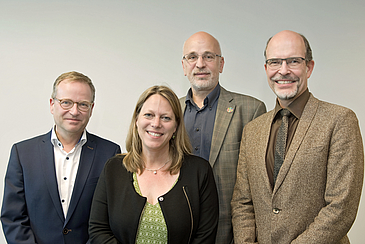Professor Georg Müller-Christ, whose research focus lies in sustainability, and Professor Christoph Burmann, a renowned marketing expert, took part in the debate with Schaefer, who has a PhD in Biology and is an alumnus of the University of Bremen. With the skillful presentation by Dean Professor Jochen Zimmermann, the faculty has perfected the format: Christian Lindner, Carsten Meyer-Heder and Carsten Sieling were already guests and provoked interesting topics of discussions. Kristina Vogt, top candidate from the Left Party (Die Linke), is still expected as a guest.
A Plea for Sharing
Maike Schaefer believes that no company will be able to get around sustainable management. “Even the biggest emitters such as AcelorMittal are adopting measures to protect the climate”, she stated. The Luneplate in Bremerhaven is to be become a green industrial area and the Bremen Port Management already has a green port concept at the ready. Concerning the consumers, the green-minded politician put in a vehement plea for sharing. “Does everyone need to own their own car? I believe they do not”, she asserted.
“Don’t Help Yourself!”
Professor Müller-Christ noted a rather verbal economy of noble aims. Yet it is still true: Economy equals growth, growth equals ownership. Will we ever be able to get away from this? “There’s a certain helplessness in attempting to solve the problem systematically”, stated the sustainability expert. “We adjust a little bit and redistribute.” In an “unbelievably differentiated product world”, which is becoming more diverse all the time, the message “Don’t help yourself!” can hardly be communicated.
Members of the Public Ignore it Entirely
Professor Burmann emphasized that Corporate Social Responsibility (CSR), thus the responsibility that companies carry in society, is also an important topic in the world of marketing. A sobering touch was added when he continued: “The members of the public ignore it entirely in terms of their individual purchasing behavior.” Consumers are not any better than they were ten years ago. Scientific research has proven this. He made a case for prohibitions, which would then have to be monitored. “If politicians set us limits then we will adhere to them”, the scientist noted. He named recycling as an example. “No one dealt with it for 25 years and no one modified the laws.”
Prohibition Party
Maike Schaefer corrected the above: “The avoidance of rubbish is better than recycling”. She spoke of how she lived plastic-free for seven weeks and of the problems she had in following through with it, for example at the cheese counter. She also knows that voluntary action does not work and agrees with Burmann. “However, we need a political consensus in order for there to be guidelines.” The Parliament of Bremen has already achieved this with the green roof regulation. The Green Party has not had a positive experience with prohibitions. “We are seen as the prohibition party. On veggie day there was criticism that we were trying to prohibit citizens from eating meat.”
Setting Incentives
The lively discussion touched on a number of aspects of sustainable management and living. From plastic in the oceans to the exploitation of textile workers in Bangladesh. From shopping as a lifestyle and event to the removal of boundaries through globalization. In the end, the presenter, Jochen Zimmermann, summarized the results as follows: incentives need to be set, clarification campaigns need to be conducted and prohibitions need to be initiated in a political frame. The top candidate from the Green Party hopes to receives “proposals for solutions that we can apply to political decisions” from field of science.

